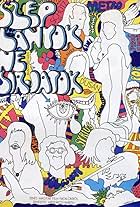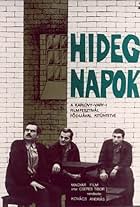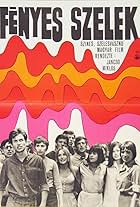Advanced search
- TITLES
- NAMES
- COLLABORATIONS
Search filters
Enter full date
to
or just enter yyyy, or yyyy-mm below
to
to
to
Exclude
Only includes titles with the selected topics
to
In minutes
to
1-31 of 31
- Banned for over a decade for its outspoken criticism of the post-WWII communist regime in Hungary, Péter Bacsó's 'The Witness' has since then achieved unparalleled cult status in its native land. Known as the best satire about communism, 'The Witness' has become a cult classic, which was also well received by critics and general audiences alike when it was finally released outside of Hungary. Its candid and realistic portrayal of the incompetent communist regime has earned great acclaim for both the director and the film itself when it was shown at Cannes Film Festival in 1981. 'The Witness' takes place during the height of the Rákosi Era, which was closely modeled after the ruthless and brutal Stalin regime. The film follows the life of an ordinary dike keeper, József Pelikán, who has been caught for illegally slaughtering his pig, Dezsõ. Instead of doing hard time for his "heinous" crime, Pelikán is elevated into an important position, generally reserved for the communist elite. Of course, Pelikán is utterly clueless about his newfound luck, not to mention his new job. Even his new benefactor, the mysterious Comrade Virág, is reluctant to reveal the real reason behind Pelikán's preferential treatment. Thus, begins Pelikán's hilarious adventure deep within the "sophisticated" communist society. One failure after another the incompetent Pelikán is elevated higher and higher on the communist echelon, all the while remaining completely clueless about his promotions. Until one day, when he gets called for to return the "favour" by falsely testifying against his long-time friend in a mock-up show trial.
- In Budapest, two rival gangs of young boys lay claim to a vacant lot. The hostilities escalate yet never quite boil over into actual violence. The film poignantly portrays the struggles and resilience of youth amid the harsh realities of war.
- Savanyú and his friends work at a plant. After the monotonous shifts they engage in the pleasures of the afternoon and the night: Sex, parties and concerts. Savanyú dates Juli, who works in workers' hostels with the other girls. They are already engaged, but have almost no time to spend together. At a concert held in the Park of Youth, Juli gets to know Géza. They flirt and eventually travel through the country with a pop-group. Savanyú goes after them and catches up with Géza and the pop-group. A minor fight cools the atmosphere. Juli must decide, and her choice is Savanyú. Nothing can stop the wedding now.
- Set in the 1890s on the Hungarian plains, a group of farm workers go on strike in-which they face harsh reprisals and the reality of revolt, oppression, morality and violence.
- Allegory of the suppression of the 1919 revolution and the advent of fascism in Hungary; in the countryside, a unit of the revolutionary army spares the life of father Vargha, a fanatical priest. He comes back and leads massacres. A new force, represented by Feher, apparently avenges the people, but only to impose a different, more refined and effective kind of repression.
- The wife of a political prisoner tends to her mother-in-law and keeps from the old woman the truth about her son, whom she believes is in New York making a film.
- The Tót family resides in Northern Hungary. The couple has a daughter and a son, the latter a member of the armed forces. When his weary major is ordered to take a vacation, the son talks him into a visit to his family home. Comedy endues when the Tót's go overboard trying to make things pleasant for the visiting major in hopes of an easier life for their son the soldier.
- A young journalist resolves to find out the reasons for a murder of an agricultural farm employee, killed eight years before.
- Mail to author for translation Mikor a zarda fonoknoje meghal, az utodlas kerdeseben ket partra szakad a kolostor. Virginianak lenne a legtobb eselye, akit nemcsak a fiatalok, hanem a konzervativabb apacak is tamogatnak. De Virginia bizonytalan, szemelyes erzelmei is befolyasoljak egyik tarsa irant, vegul az eloallt helyzet sulya alatt osszeroppan.
- Set in 1946, this movie deals with the planning and execution of the January, 1942 Novi Sad massacre of 4,000 Yugoslavian Serbs and Jews by Hungarian army units. It was undertaken as a reprisal for a partisan ambush (in which 17 soldiers were gunned down). And it is mainly explored through the reminiscences of four participants--Major Buky, Lieutenant Tarpataki, Ensign Pozdor, and Corporal Szabonow--cell-mates awaiting trial. Ultimately, however, what you get is an extended debate over issues of individual responsibility.
- The preparation, in Hungary, of the assassination in Marseilles of King Alexander of Yugoslavia in 1934.
- A wheelchaired apothecary is summoned to the police station for "a particular matter". The old man is convinced that his sin is revealed, which he had committed during the war. His friends insist that they only wanted to joke with him but his conscience can no longer be silenced.
- It is 1947; the Communist Party has just taken power in Hungary. In Jancsó's first color film, young students at a People's College have a debate with seminary students, but worry it will escalate into a fight.
- While trying to find a cancer cure during WWII, an SS doctor discovered a terrible poison. 20 years after the war, the old Nazi gets out of prison, and the hunt for him and his discovery begins.
- A young soldier, who has spent the last three nights before he leaves for the front with his lover, discovers when he deserts to be with her once more that she has betrayed him, and decides to report to the police who are questioning him, that she is a Communist.
- After her husband dies, a woman questions her love for her husband and whether or not to accept money from the insurance policy. Tensions mount when her estranged son returns to the familial home with his girlfriend.
- When András, Albert and Bence are on a cycling tour around Lake Balaton, their dreams come true. Sunshine, beach and pretty girls. András and his younger brother run after the same girl, Eszter. András persuade his brother not to pinch the girl. András pick her up one night and split up with her next day. Eszter follows the boy, but András sends her away.
- An engineer gets all the blame for reporting a mistake because his bosses are worried about the possible consequences.
- Zsuzsa is a third-year student, majoring pedagogy. She is in love with Zoltan. They have a child. Zoltan will remain in the department though Zsuzsa and him used to fight against the university's policy. After a night spent with friends in Paris when May 68 Events occurred, Zsuzsa decides to separate.
- A story about a young teacher who has great ambitions to work in a village called Szentjános. And since she doesn't just want changes in the school, she will soon come face to face with the locals.
- A real Hungarian spy story from the 60s. An entire army of spies across the ocean is fighting for the Hungarian invention that protects humanity, because in this country they would only start manufacturing it in the next five-year plan. The checkered briefcase is carried by the engineer of the invention office over mountains and valleys, on trains and in the air. The prominent figure of the police group led by Pharaoh, the Mummy, also gets involved in the complicated chases.























